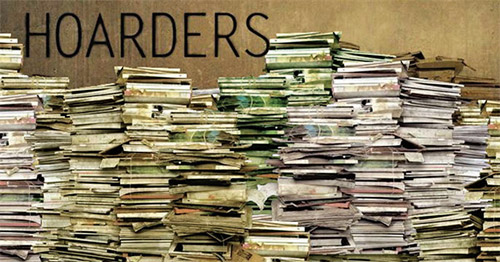
It’s happened to all of us at one point in our lives. We get hooked on a really bad TV show. We sit there glued to the screen. Our brains are pleading with us to turn off this god-awful show, but our hearts will have none of this logic. We’ve all had our drug of choice, whether you choose to admit it or not. Maybe you dabbled in The Real Housewives of Orange County, attempted to relive your childhood with some Fuller House or secretly tried to keep up with the Kardashians.
I’m not here to judge, because this happened to me a few years ago as well.
I found myself fascinated by a show called Hoarders. For those not familiar, it’s a reality show depicting people that suffer from compulsive hoarding disorder. These people would collect anything and everything. From scrap metal, to old appliances, tools, office supplies and even bunnies. Yes, bunnies.
See, Kathy and Gary really liked rabbits. I mean, who doesn’t enjoy seeing the occasional fluffy tail and long ears, right? Only they really, really liked bunnies. So they kept on inviting more and more rabbits inside their home until they literally had no room to sleep anymore. It was at that point that they realized they had a bunny problem.
But I remember one specific episode about a woman named Carol. Carol started hoarding boxes and boxes of documents until there was no longer a place to sit down in the home. She had legal documents, tax documents, instruction manuals, old bills, you name it. I remember watching that episode and deciding that I wasn’t going to turn into a Carol. My house was not going to be filled with boxes of documents that I no longer need. And now I’m gonna show how you can become less Carol-like yourself.
Every year you compile a big fat stack of tax documents that’s needed to prepare your taxes. The question I’m often asked by clients is how long do they need to save these documents. After all, if you had to save all of your documents every year then by the time you turned 60 your home would look like Carol’s.
IRS Guidance
According to the IRS, you must keep your records that support an item of income, deduction or credit shown on your tax return until the period of limitations for that tax return runs out. The period of limitations is the period of time in which you can amend your tax return to claim a credit or refund, or the IRS can assess additional tax.
The IRS provides the following guidelines:
- Keep records for three years if situations (4), (5) and (6) below do not apply to you.
- Keep records for three years from the date you filed your original return or 2 years from the date you paid the tax, whichever is later, if you file a claim for credit or refund after you file your return.
- Keep records for seven years if you file a claim for a loss from worthless securities or bad debt deduction.
- Keep records for six years if you do not report income that you should report, and it is more than 25 percent of the gross income shown on your return.
- Keep records indefinitely if you do not file a return.
- Keep records indefinitely if you file a fraudulent return.
- Keep employment tax records for at least four years after the date that the tax becomes due or is paid, whichever is later. (This is only relevant if you are an employer.)
So, the general rule is that you should hold on to your documents for three years. After this period, the statute of limitations for an IRS audit expires. (As a side point, the statute of limitations for New Jersey is four years, so if you file a New Jersey state tax return you should hold on to the documents for an extra year.) In numbers (5) and (6) above, the IRS requests that if you decide not to file a tax return or to file a fraudulent return then at least have the decency to keep good tax records. For documents related to property (purchase records, receipts for improvements etc.), hold on to those until the statute of limitations expires after the sale of such property.
Better Solution
Storing all of these documents, even if only for three years, can still be a hassle. Luckily, you have a better option now. That’s because it’s 2017, and we live in a digital world. Even the IRS, which is the equivalent of your Great-Aunt Sally who still has a Juno email account and calls you anytime she needs to record a television show, allows you to scan documents and store them electronically. The key rule is that your scanned or electronic receipts must be as accurate as your paper records and you must be able to index, store, preserve, retrieve and reproduce the records. In short, you must keep your records organized and be able to produce them in a hard copy form if needed.
By Daniel Magence, CPA, Esq.
Daniel Magence, CPA, Esq. is a principal at Pristine CPA Solutions, LLC (www.pristinecpa.com). Pristine CPA Solutions offers tax and accounting services to individuals and businesses of all sizes, whether its tax returns, bookkeeping, payroll services or personal income budgeting. He can be reached at [email protected] or 201-326-6908 if you have any questions or comments, or are interested in using Pristine CPA’s services. Feel free to contact us for a free consultation.










